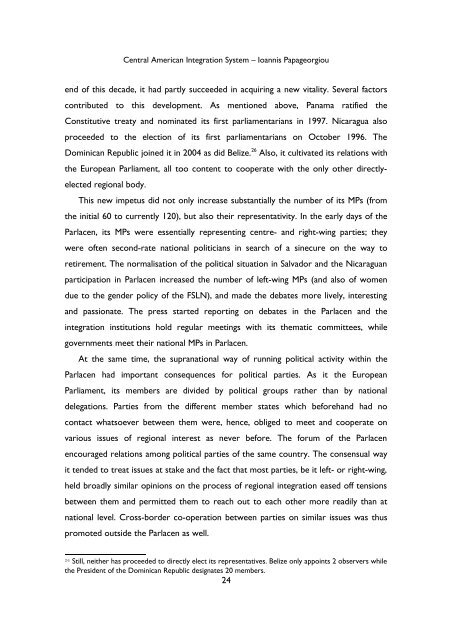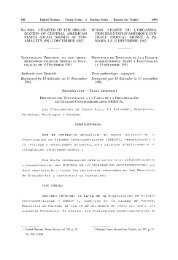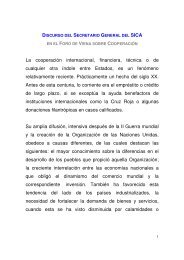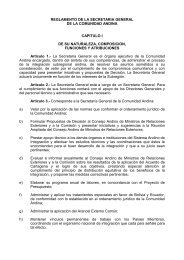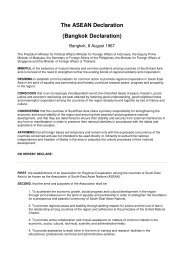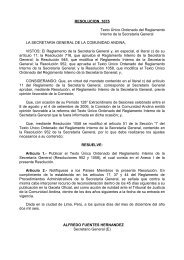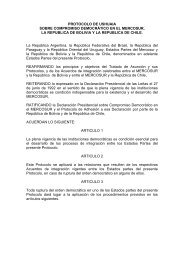Central American Integration System â Ioannis Papageorgiou
Central American Integration System â Ioannis Papageorgiou
Central American Integration System â Ioannis Papageorgiou
Create successful ePaper yourself
Turn your PDF publications into a flip-book with our unique Google optimized e-Paper software.
<strong>Central</strong> <strong>American</strong> <strong>Integration</strong> <strong>System</strong> – <strong>Ioannis</strong> <strong>Papageorgiou</strong><br />
end of this decade, it had partly succeeded in acquiring a new vitality. Several factors<br />
contributed to this development. As mentioned above, Panama ratified the<br />
Constitutive treaty and nominated its first parliamentarians in 1997. Nicaragua also<br />
proceeded to the election of its first parliamentarians on October 1996. The<br />
Dominican Republic joined it in 2004 as did Belize. 26 Also, it cultivated its relations with<br />
the European Parliament, all too content to cooperate with the only other directlyelected<br />
regional body.<br />
This new impetus did not only increase substantially the number of its MPs (from<br />
the initial 60 to currently 120), but also their representativity. In the early days of the<br />
Parlacen, its MPs were essentially representing centre- and right-wing parties; they<br />
were often second-rate national politicians in search of a sinecure on the way to<br />
retirement. The normalisation of the political situation in Salvador and the Nicaraguan<br />
participation in Parlacen increased the number of left-wing MPs (and also of women<br />
due to the gender policy of the FSLN), and made the debates more lively, interesting<br />
and passionate. The press started reporting on debates in the Parlacen and the<br />
integration institutions hold regular meetings with its thematic committees, while<br />
governments meet their national MPs in Parlacen.<br />
At the same time, the supranational way of running political activity within the<br />
Parlacen had important consequences for political parties. As it the European<br />
Parliament, its members are divided by political groups rather than by national<br />
delegations. Parties from the different member states which beforehand had no<br />
contact whatsoever between them were, hence, obliged to meet and cooperate on<br />
various issues of regional interest as never before. The forum of the Parlacen<br />
encouraged relations among political parties of the same country. The consensual way<br />
it tended to treat issues at stake and the fact that most parties, be it left- or right-wing,<br />
held broadly similar opinions on the process of regional integration eased off tensions<br />
between them and permitted them to reach out to each other more readily than at<br />
national level. Cross-border co-operation between parties on similar issues was thus<br />
promoted outside the Parlacen as well.<br />
26<br />
Still, neither has proceeded to directly elect its representatives. Belize only appoints 2 observers while<br />
the President of the Dominican Republic designates 20 members.<br />
24


